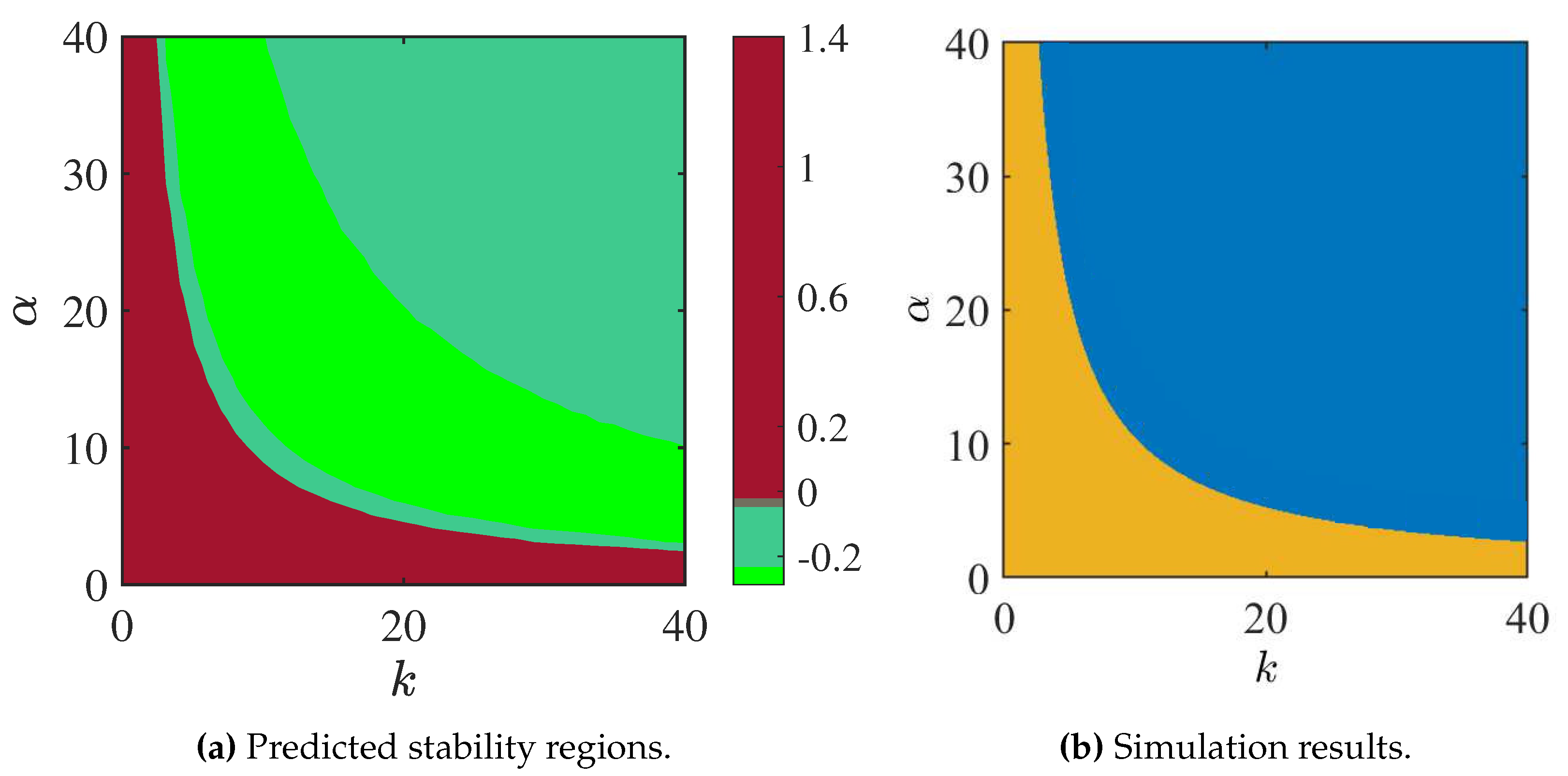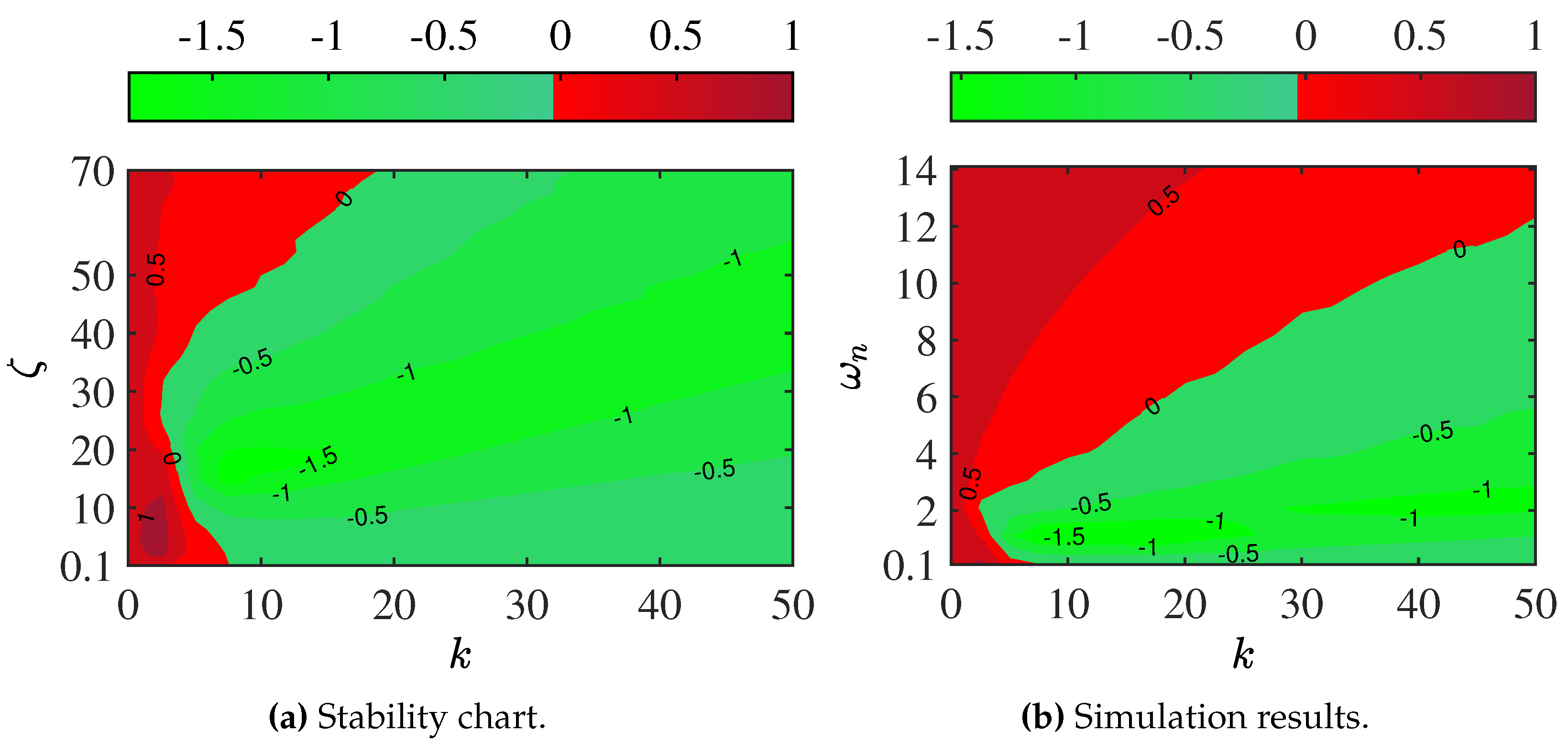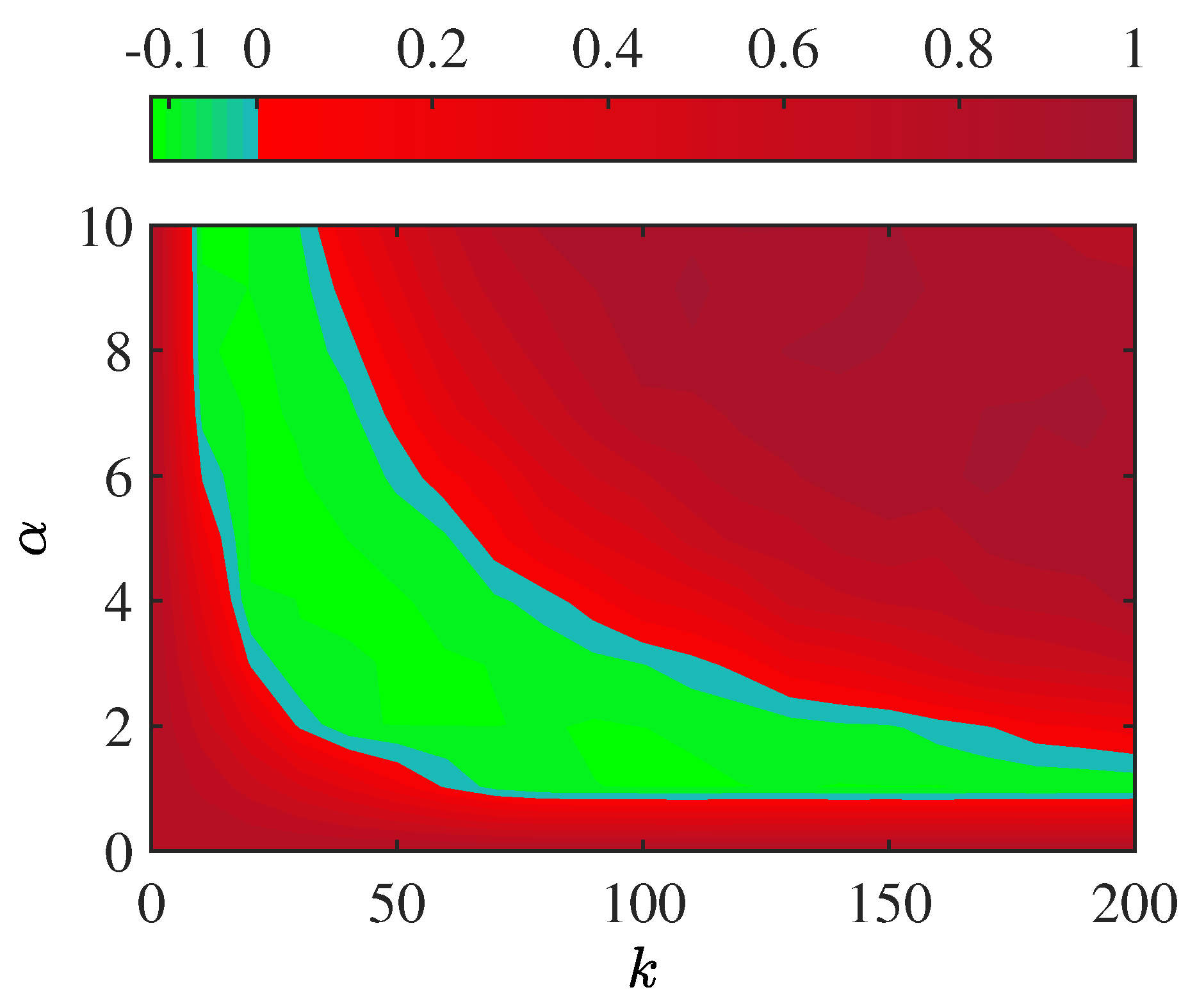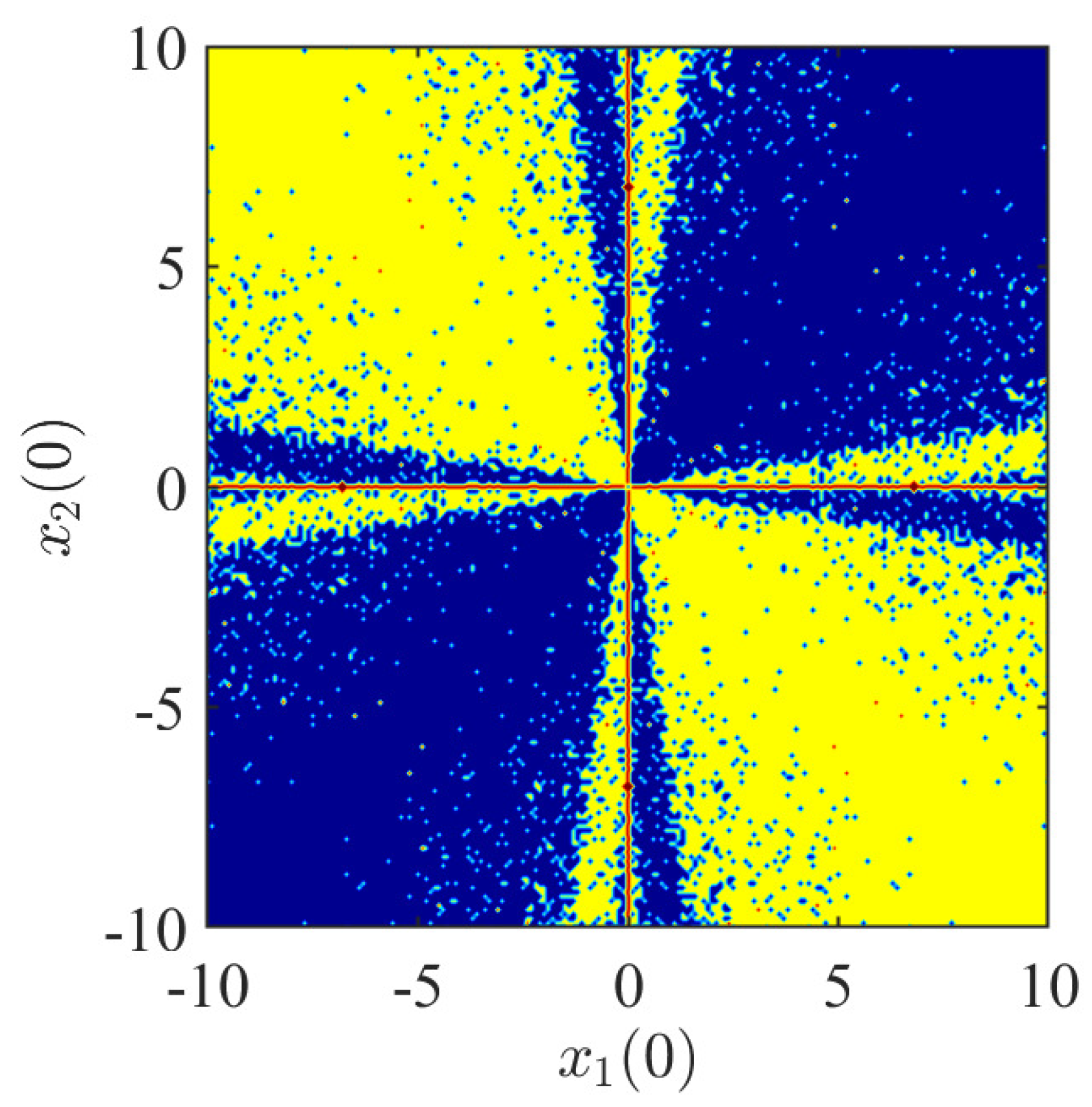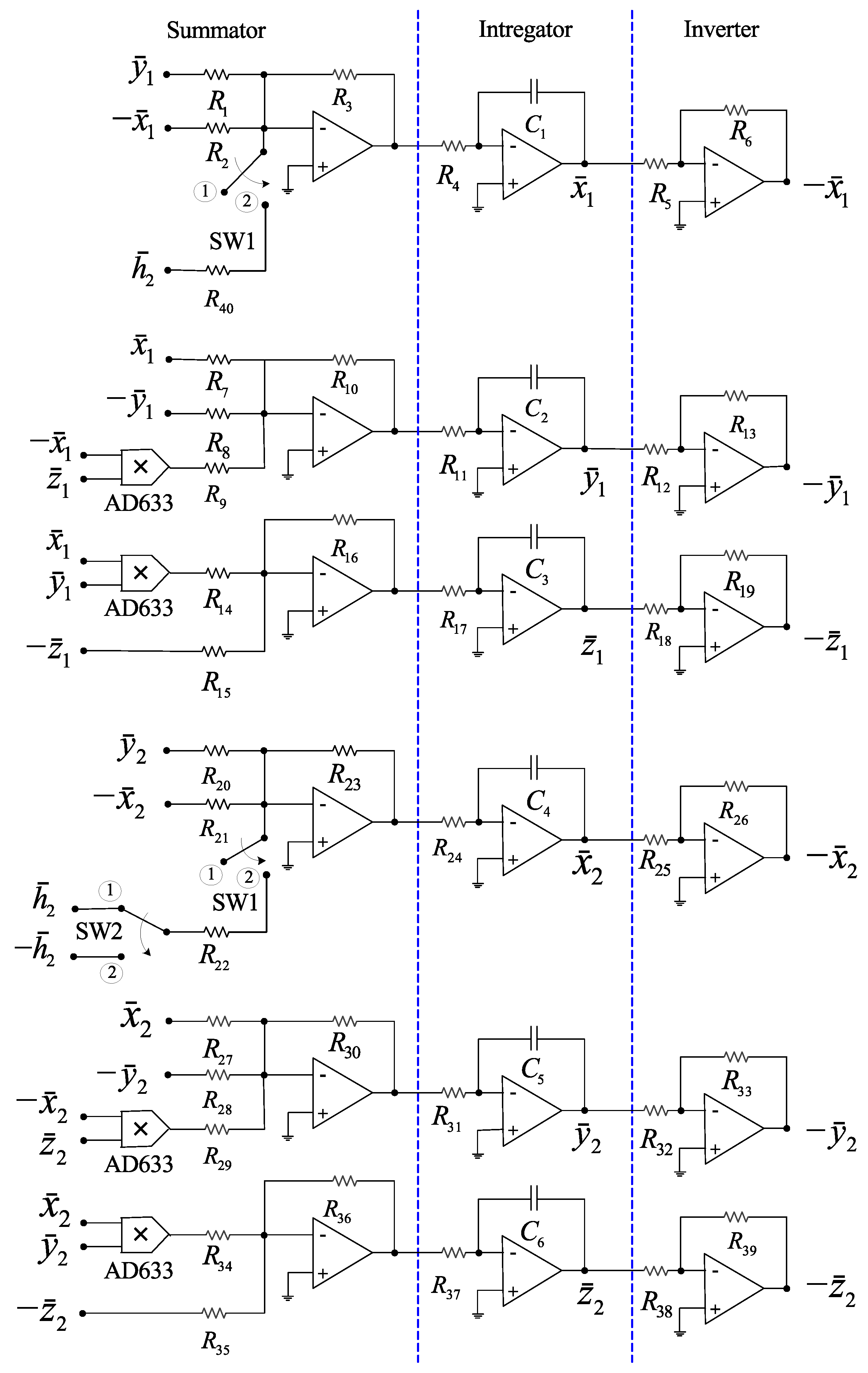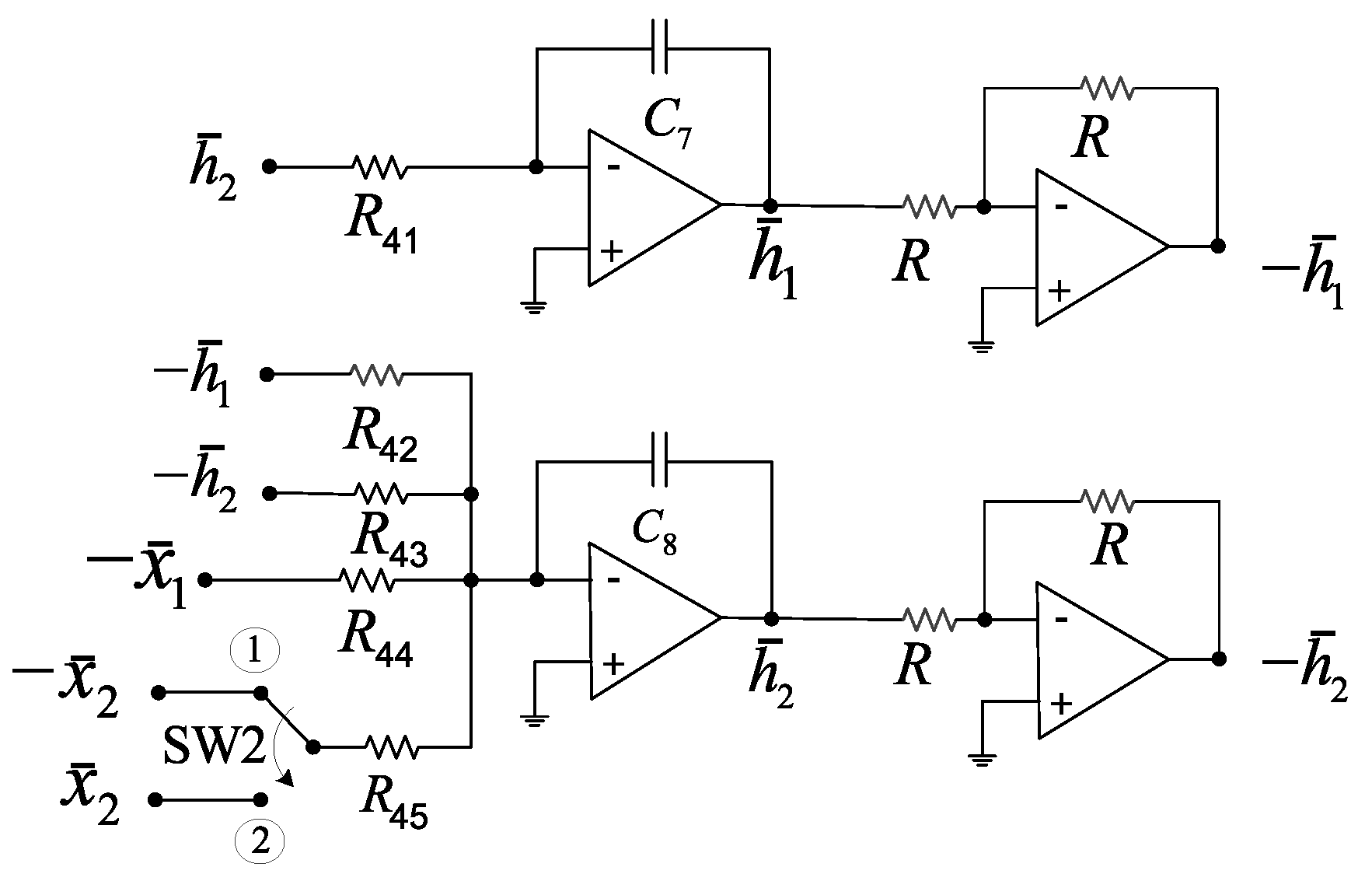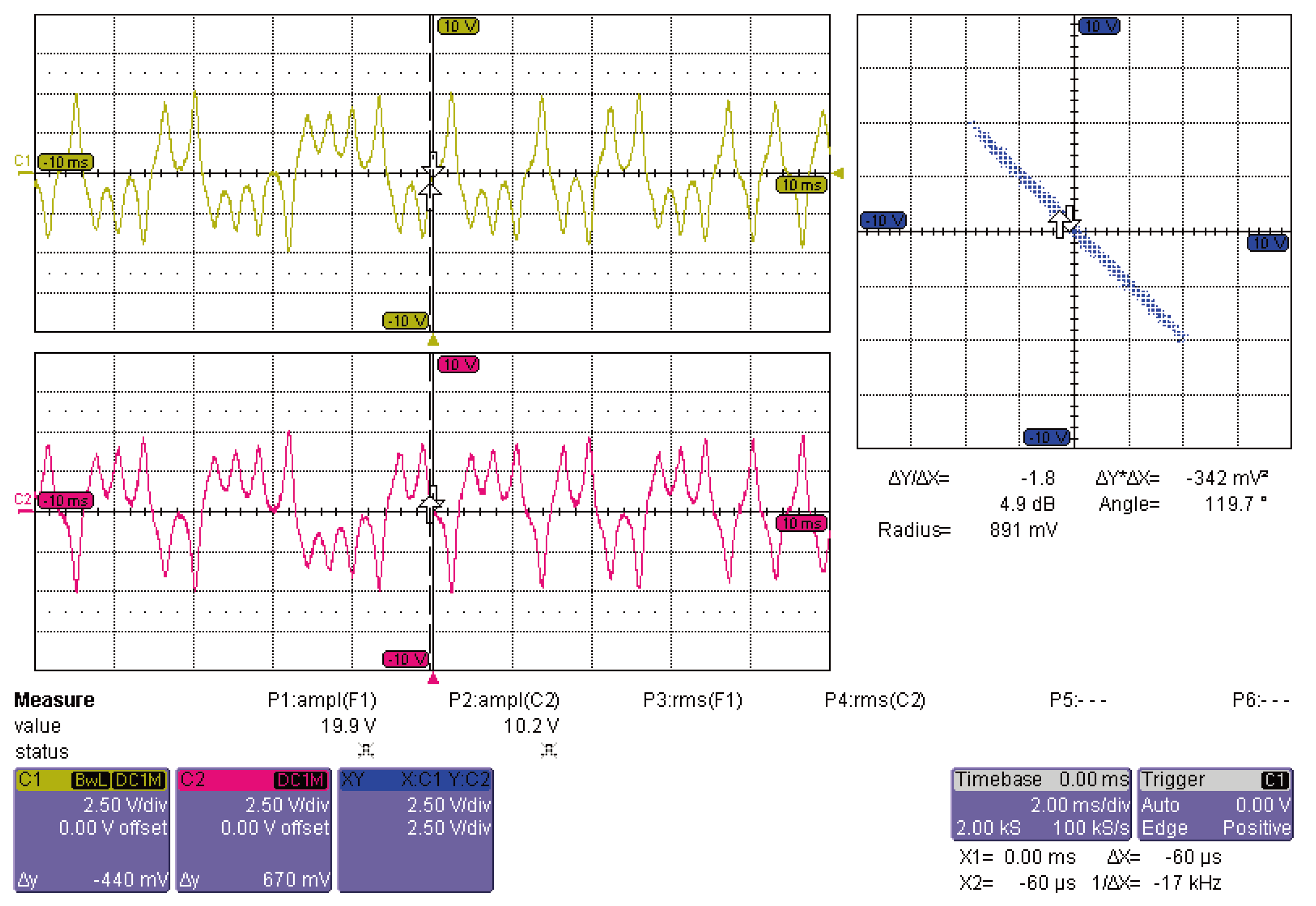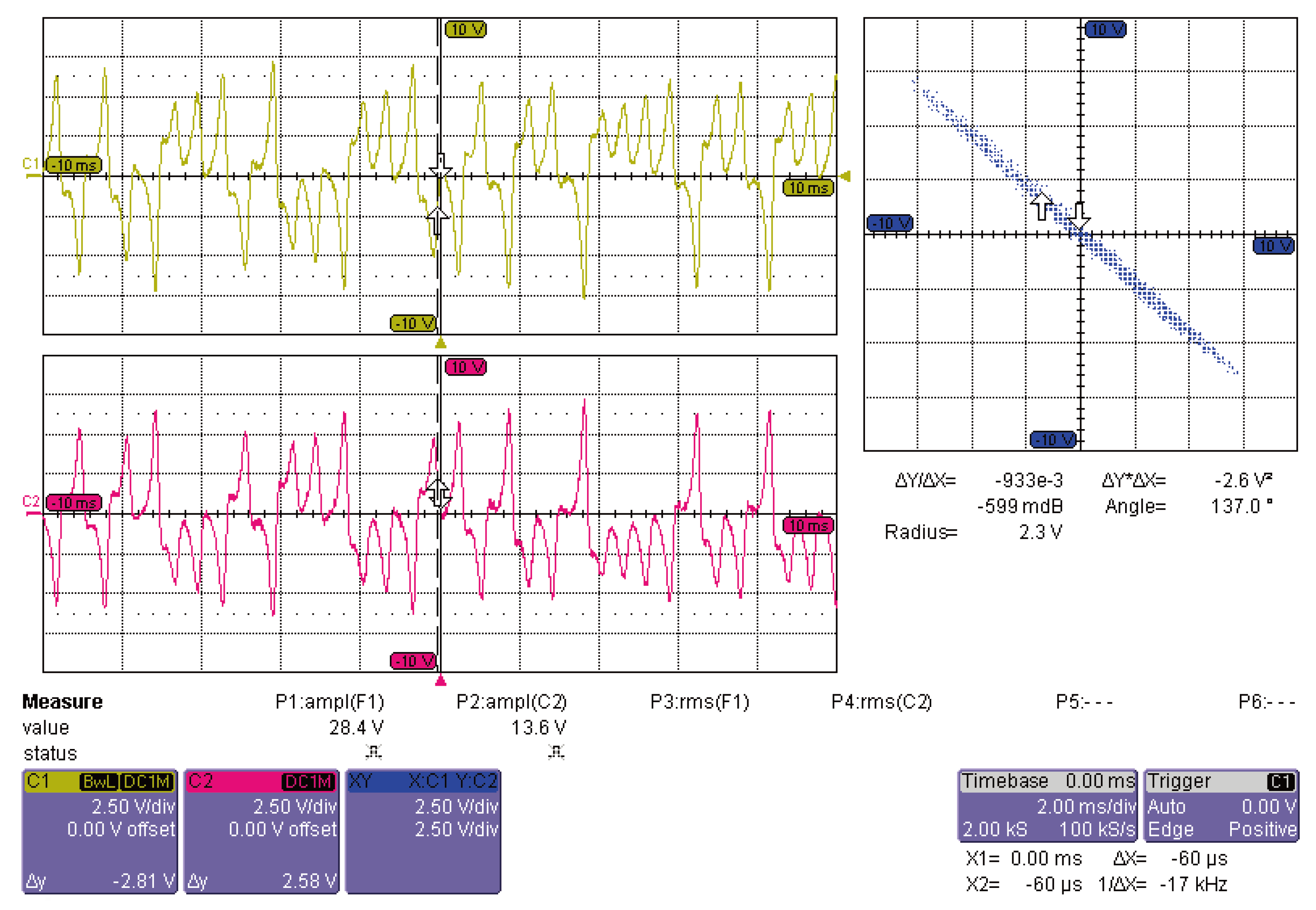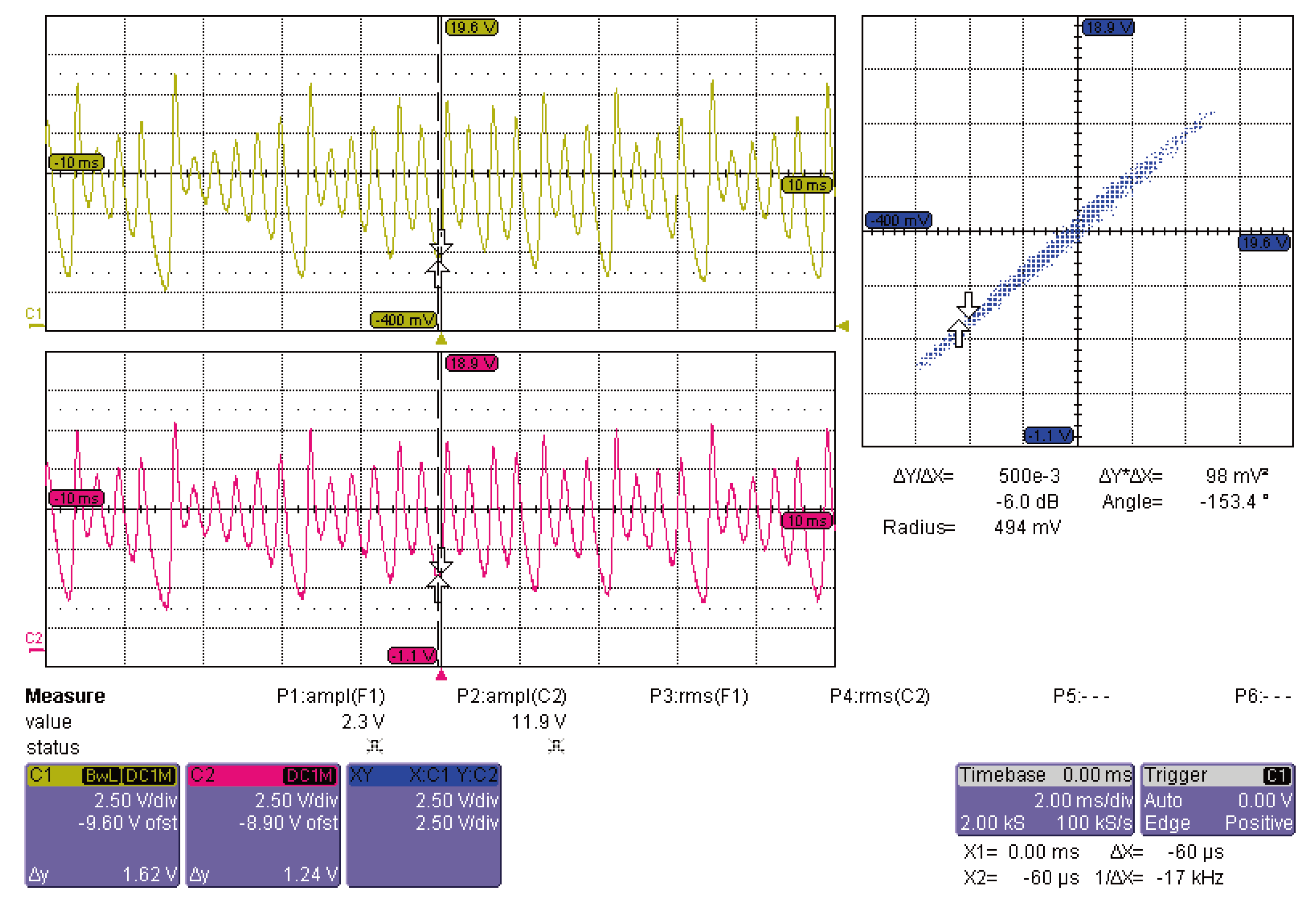1. Introduction
Synchronization—i.e. adjustment of rhythms to a certain pattern—is one of the most dominant behaviors in the universe. There are oscillating systems where synchronization occurs naturally, like for example biological systems, where it has been found that two or more cells, independently of their nature, or functioning, may synchronize by using signaling messengers (as for example light) as the coupling signal [
1]. Furthermore, spontaneous synchronization may also emerge in inert systems. This is the case of, for example, pendulum clocks suspended from a common structure oscillating synchronously [
2,
3], metronomes placed on a wooden structure supported by soda cans moving in perfect synchrony [
4], and in the arena of soft polymeric materials, liquid crystalline oscillators excited by light may exhibit in-phase and anti-phase motion [
5].
In other cases, the synchronization phenomenon is artificially induced by, for instance, a control law. This kind of synchronization is called, for obvious reasons, controlled synchronization [
6,
7,
8]. As an example, the reader may consider the coordination, formation and synchronization of robots and quadcopters [
9,
10,
11,
12,
13], the synchronization of renewable energy-based hybrid micro-grids [
14], or the synchronization of wireless network terminals, which are of vital importance in communication systems [
15,
16].
Synchronized behavior can also be observed in chaotic systems. Due to their sensitivity to initial conditions, these systems are not expected to synchronize in a natural way. However, it is possible to find suitable synchronizing schemes like drive-response configuration, bidirectional interconnection, or mutual coupling, such that two (or more) chaotic systems achieve synchronization [
17].
Most of the existing synchronization schemes for chaotic systems are based on the so called-diffusive coupling, in which the oscillators interact through the weighted difference of (part of) their states [
18,
19]. This type of coupling can be further used in the context of networks for inducing different types of synchronous motion like, for example, cluster synchronization [
20], explosive synchronization [
21], generalized synchronization [
22],chimera states [
23], among others.
However, it has been observed that diffusive couplings may have some limitations like, for example, inducing synchronization only within a limited interval of coupling strength values, or even worst, this type of couplings may not suffice to synchronize the systems [
24]. Therefore, some methodologies have been proposed in the literature in order to enhance the performance of this type of couplings. For example, it has been shown that the use of transient uncoupling, i.e., intermittent activation of the coupling each time the state of the system is within some region of the chaotic attractor, can enhance the synchronizability of the interconnected systems [
25]. Another alternative to improve the performance of diffusive couplings is to add time delays to the interconnection, as shown in our previous work [
26].
Likewise, an enhancement in the synchronizabilty of chaotic oscillators can be achieved by replacing the diffusive coupling by a dynamic interconnection—also referred to as environmental coupling in the literature—where the interaction between the oscillators is indirect via a dynamical system [
27]. The power of dynamic coupling relies on the fact that it can be used for synchronizing chaotic and hyper-chaotic systems that are non synchronizable when using standard diffusive couplings, see. e.g. [
28,
29,
30]. Also, for the case of networks, diffusive coupling may have a limitation in the maximum number of oscillators that can be synchronized. However, by using dynamic coupling, it is possible to synchronize a larger number of oscillators [
31].
Consequently, in this paper, we further explore the use of dynamic couplings for synchronizing chaotic systems. Specifically, we consider a synchronization scheme, in which the systems do not interact directly (like in the classic master-slave configuration or bidirectional coupling), but rather through a linear second order dynamical system.
The design of the proposed coupling resembles the type of coupling used by Huygens for synchronizing his pendulum clocks, such that each chaotic system receives exactly the same coupling signal. Then, at first sight, it may not be intuitive to see why a common coupling signal can synchronize two chaotic systems, which are well-known to be extremely sensitive to initial conditions.
Through the analysis, we consider chaotic systems having a particular type of symmetry such that two types of synchronization are observed: complete synchronization and mixed synchronization, where part of the state variables synchronize in anti-phase whereas the rest of synchronize in-phase. In both cases, the stability of the synchronous solution is investigated by using the master stability function approach, and the obtained results are illustrated by means of computer simulations. Finally, an experimental study is conducted by using chaotic oscillators implemented in electronic circuits.
The outline of this paper is as follows. First, a brief description of the original Huygens’ coupling is presented in
Section 2, whereas the proposed synchronization scheme and the corresponding problem description are presented in
Section 3 . Next, the stability of the synchronous solutions in the coupled systems is investigated in
Section 4, and an application example is presented in
Section 5. Then, the obtained experimental results are summarized in
Section 6. Finally, in
Section 7, a discussion and some conclusions are provided.
2. Preliminaries: Huygens Coupling
One of the earliest scientific reports on spontaneous synchronization of inert systems dates back to the seventeen century, when the eminent scientist Christiaan Huygens observed—by serendipity—that two pendulum clocks were oscillating in harmony, at the same pace, but in opposite directions, a phenomenon baptized by Huygens as the
symphaty of clocks. The peculiar experimental setup used by Huygens is shown in
Figure 1(a). It consists of two pendulum clocks mounted on a wooden bar, which in turn is mounted on the top of two chairs. Through the years, several mathematical models have been derived in order to explain the synchronization phenomenon observed by Huygens [
2,
32,
33,
34].
For the modelling, most of the existing works consider the clocks as simple pendulums and the coupling structure is modelled as a rigid bar elastically attached to a fixed support, as shown in Figure
Figure 1(b). Under these considerations, the mathematical model of Huygens experiment is given by the following set of equations:
where
are the angular displacement of the pendulums,
is the horizontal displacement of the coupling rigid bar, and
are the mass, length and rotational damping of the pendulums, whereas
are the mass, stiffness and damping coefficients, respectively, of the coupling bar. The external torques
correspond to the escapement mechanism that is responsible of keeping the oscillations in the pendulum. It is the mechanism that produces the characteristic
tic and
toc in a mechanical clock.
Note that the coupling between the clocks, which is referred to as Huygens’ coupling in the literature, see e.g. [
36], is a mass-spring-damper system described by a second order equation and thus it can be classified as a dynamic coupling. Another important observation is that both clocks are equally influenced by the coupling, i.e., the clocks receive the same signal
, which corresponds to the acceleration of the coupling bar, as can be seen from the first two equations in (
1).
Depending on the parameters of the coupling bar, the pendulums may synchronize in-phase or in anti-phase, among other limit solutions. In fact, in [
37], the authors have shown that just by changing the mass of the coupling bar, it is possible to switch from in-phase synchronous motion to anti-phase synchronization and viceversa.
Inspired by this, in this work we want to address the following questions. Can we use Huygens’ coupling for synchronizing chaotic oscillators? If yes, would it be possible to switch between two different synchronous states by just changing a parameter in the coupling?
In what follows, we demonstrate that the answer to the aforementioned questions is affirmative.
3. Proposed Synchronization Scheme and Problem Description
The basic idea in this work is to apply Huygens’ coupling in the context of chaotic oscillators. Roughly speaking, we want to
replace the pendulums in the schematic diagram of
Figure 1(b) by chaotic oscillators, as shown in the block diagram of
Figure 2, and to determine the possible synchronous behaviors.
Mathematically, the proposed coupling scheme is described by
where
is the state vector of oscillator
,
is the state vector of the dynamic coupling,
is the coupling strength, the matrices
and
determine, which variables of the oscillators and the dynamic coupling are used for the interconnection,
is a binary parameter, i.e.,
, such that, as we will show later in
Section 4,
for complete synchronization, whereas
for mixed synchronization. Furthermore,
is a nonlinear function describing the intrinsic dynamics of the oscillators and matrix
is given by
where
are the dimensionless damping and natural frequency, respectively, of the dynamic coupling. It is well-known, see e.g. [
38], that the dimensionless parameter
determines the transient response of system (4) when
: underdamped for
, critically damped for
, and overdamped for
.
Through this work, we are interested in a particular class of chaotic oscillators namely, systems that have an especial axial symmetry such that the coupled systems not only achieve complete synchronization but also, the so called mixed synchronization, where part of the state variables synchronizes in anti-phase, whereas the rest of variables are fully synchronized. Our ultimate goal is to show that, by changing one single parameter in the proposed dynamic coupling, two different types of synchronous behavior can be observed, just as is the case in the original Huygens’ experiment of synchronized pendulum clocks.
Consequently, the state of the oscillators is partitioned as follows
where
,
, is the part of the state that can synchronize either in-phase or in anti-phase, whereas
,
contains the variables that only can synchronize in-phase.
According to the above state partition, the function
and the coupling vectors
and
are also partitioned as follows
where
,
,
,
,
,
.
Then, the following assumption is required
- A1
The uncoupled system, i.e.,
, is invariant under the transformation
Note that this assumption implies that the functions
and
satisfy
Furthermore, from the results presented in [
39], it follows that assumption 1 guarantees the existence of the mixed synchronous solution.
Now, we are ready to provide the following definitions.
Definition 1 (Complete Synchronization).
The coupled system (2)-(4) is said to achieve complete synchronization if
Definition 2 (Mixed Synchronization).
The coupled system (2)-(4) is said to achieve mixed synchronization if
Note that in both definitions, it is required that the effect of the coupling signal vanishes, i.e., the coupling should be noninvasive in the sense that, its influence disappears once the oscillators are synchronized.
5. Application Example
Now, we illustrate the performance of the proposed coupling scheme (
2)-(4). To this end, we consider a pair of chaotic Lorenz systems.
For the sake of example, we choose the following coupling matrices
where
. For this choice, the dynamic coupling will be applied to the first equation of each Lorenz oscillator.
Then, system (
2)-(4) takes the following explicit form
where
are the state variables of oscillator
i, for
, and the state variables of the Huygens’ coupling are given by
.
Note that each uncoupled oscillator is invariant under the transformation
, i.e., Assumption
, see Eq. (
8), is satisfied. Thus, it is expected that both complete and mixed synchronization exist in the coupled system (
30)-(32).
Now, we investigate the stability of the synchronous solutions (
10) and (
11) in the coupled system (
30)-(32). As a first step, we have found that, for this example, the variational equation (
16) corresponding to complete synchronization and the variational equation (
28) corresponding to the mixed synchronous solution, are equal, i.e.,
where
and
correspond to the trajectories of an isolated Lorenz system.
The next step is to compute the largest transverse Lyapunov exponent
either from Eqs. (
16)-(
33) or from Eqs. (
28)-(
33). In this case it does not matter which equation we use for the stability analysis, since for this particular case both equations are identical as mentioned above. For the computation of
, we use the Wolf algorithm [
40] and the following parameter values:
, which are the standard values for the Lorenz system, and, for the dynamic coupling, we take
and
. With this, the largest transverse Lyapunov exponent
is computed as a function of the coupling strength
k and parameter
, both are varied in the interval
in steps of 0.5. The obtained results are shown in
Figure 3(a), where the green colors indicates the areas where
is negative and therefore, in that region of the (
)-plane, the complete synchronous solution is locally stable for
, whereas the mixed synchronization solution is locally stable for
. Different green tones are used to indicate how negative is
. On the other hand, in the red region,
is positive and thus, for that combination of values of
the synchronous solution, either complete synchronization or mixed synchronization, is unstable.
In order to validate the stability regions shown in
Figure 3(a), we numerically integrate system (
30)-(32) using the Runge Kutta method, with step size of 0.001, and the same parameter values used for generating
Figure 3. The system response is studied as a function of the scaling factor
and the coupling strength
k. Again,
is varied in the interval
and
is varied in the interval
, both in steps of 0.25, and we set
. Moreover, the initial conditions used in the analysis are
. The obtained results are shown in
Figure 3(b). The blue color indicates the region where the oscillators achieve complete synchronization, whereas the orange area indicates the region where the oscillators do not synchronize. Exactly the same graph is obtained if
is changed to
. However, in such case, the blue color will indicate the region of mixed synchronization and again the orange region will correspond to unsynchronized behavior.
We can see that there is a complete agreement between the predicted stability regions and the numerical simulations shown in
Figure 3. The red region in panel (a), where
corresponds to the orange region in panel (b), where the oscillators behave unsynchronized. Likewise, the green areas on panel (a), where
coincide with the blue are on panel (b), where the oscillators achieve synchronization in the simulation.
Note that the results presented in
Figure 3 correspond to a particular choice of
and
, which are parameters of the Huygens coupling, see Eq. (
5). However, a natural question at this point is how the choice of these parameters affects the stability of the synchronous solution. To see this, we compute
, as a function of the coupling strength and these parameters. First, from
Figure 3(a), we chose a value of
within the lemon green region, for example
. Then, using the same parameter values as used in
Figure 3, we compute
from from Eqs. (
16)-(
33) as a function of
k and
. The obtained results are shown in
Figure 4(a). We can see that
is more negative around the interval
.
Also, for large values of a larger coupling strength k is required for making stable the synchronous solution.
Next, we fix the value of
in
and we compute again
but this time as a function of
k and
. The results are depicted in
Figure 4(b). It can be seen that an optimal value of
, for which the largest transverse Lyapunov exponent is more negative is
.
Thus, in summary, from the results presented in Figures (
Figure 3) and (
Figure 4) we can conjecture that, for the coupled system (
30)-(32) and the considered parameter values, an optimal choice (optimal in the sense that the resulting
is more negative) of the parameters of the dynamic coupling is:
and
.
In a second numerical study, we analyze the case where the interaction between the Lorenz oscillators is via the third variable. Hence, the coupling matrices in
are selected as follows
The variational equation for the case of complete synchronization, i.e.,
, is as given in Eq. (
16) with
Remark 1.
Note that, in this particular example, it is possible to observe both complete and mixed synchronization,withoutchanging the value of β. The reason of this is because, the variational equation of the mixed and complete synchronous behavior, for , are the same.
Now, we compute the largest transverse Lyapunov exponent
from Eq. (
16)-(
35), as a function of the coupling strength
k and parameter
. The parameter values of the Lorenz oscillators are the same as used in the studies above, whereas the parameter values of the coupling system are set to
and
.
The obtained results are shown in
Figure 5, where it can be seen that there is a small region in the (
)-plane (green are) where the
is negative and consequently, the synchronous solution either complete synchronization or mixed synchronization is locally stable.
From Remark 1, it follows that without changing any parameter in the system, it may be possible to observe the so called multistability, i.e., different stable behaviors may be observed, depending on the initial conditions. To show this, we numerically integrate system (
2)-(4) with the coupling vectors given in (
34). The parameter values of the Lorenz system are the same used so far, i.e.,
, and
. For the Huygens coupling the parameters are
and
and the coupling strength
k and
are chosen from the green region in the
plane shown in
Figure 5. We choose
and
. Furthermore, we use the Runge-Kutta method with step size of 0.001 and the initial conditions
are varied in the interval
in steps of 0.1 and the rest of initial conditions are all set to zero.
The obtained numerical results are shown in
Figure 6, from which the multistability of solutions becomes evident. Specifically, from that figure we can distinguish three behaviors: complete synchronization (blue), mixed synchronization (yellow) and a nonhomogeneous equilibrium solution (red lines on the axes), where the oscillators converge to an unsynchronized equilibrium point.
6. Experimental Results
Finally, in this section, the performance of the proposed synchronization scheme based on Huygens’ coupling is experimentally demonstrated. To this end, system (
30)-(32) is physically implemented with analog electronic circuits.
As a first step, system (
30)-(32) is scaled by introducing an attenuation factor such that
,
,
,
, for
.
Furthermore, the system is also scaled in time by introducing the transformation , where is a dimensionless time and .
Under these considerations, the scaled version of system (
30)-(32) is written as follows
As a next step in the design of the circuit, the parameters in the above system are rewritten in terms of resistors and capacitors.
This is the system of equations that we use for electronic implementation using analog circuits, including resistors, capacitors, multipliers and operational amplifiers.
The schematic diagram of the circuit is shown in
Figure 7, whereas the circuit for the Huygens’ coupling is depicted in
Figure 8. In these diagrams, switch 1 (SW1) has been added with the purpose of coupling or decoupling the systems, i.e. when SW1 is in position 2, the systems are coupled, otherwise the systems are uncoupled or isolated.
On the other hand, switch 2 (SW2) is indeed the parameter
. For
, i.e. mixed synchronization, switch SW2 in the diagram of
Figure 7 should be in position 1, whereas the switch SW2 in
Figure 8 should be in position 2. On the other hand, for
, i.e., for complete synchronization, the positions of the switches SW2 mentioned before have to be reversed.
For the experiments, we consider the components and values that are summarized in
Table 1. These parameter values correspond to the following parameter values in the scaled system (38)-(43):
and
. For these values, mixed and also complete synchronization are expected to be stable.
The obtained experimental results, for the case of mixed synchronization, are shown in
Figure 9,
Figure 10 and
Figure 11. The time series are recorded using a Teledyne Lecroy oscilloscope. As can be seen, besides the unavoidable (small) differences in the components of the circuit, the variables (voltages)
and
are in anti-phase, see
Figure 9, the variables
and
are also in anti-phase, as shown in
Figure 10, whereas the
and
variables are in complete synchrony, see
Figure 11. Thus, the circuit exhibits the desired mixed synchronization behavior according to Definition 2, see Eq. (
11).
When is switched to , the circuit achieves complete synchrony (for the sake of brevity and length of the paper, these experiments are not included).
These experimental results are in good agreement with the numerical results presented in
Section 5. Note, however, that due to the fact that in the physical implementation the systems are inherently non identical, what we really observe in the experiments is the so-called practical synchronization [
41]. This can be seen, for instance, from the phase planes shown in the above figures, where we can observe that the diagonal line is a bit tick, indicating that perfect synchrony is not achieved but rather practical synchronization is achieved. Nevertheless, the experimental results are more than satisfactory and nicely illustrate and validate the performance of Huygens’ coupling.


